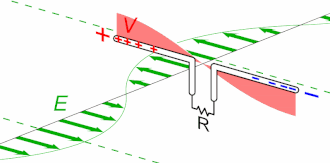History of radio § Broadcasting
Etymology
The word "radio" is derived from the Latin word "radius", meaning "spoke of a wheel, beam of light, ray". It was first applied to communications in 1881 when, at the suggestion of French scientist Ernest Mercadier, Alexander Graham Bell adopted "radiophone" (meaning "radiated sound") as an alternate name for his photo phone optical transmission system. However, this invention would not be widely adopted.
Following Heinrich Hertz’s discovery of the existence of radio waves in 1886, a variety of terms were initially used for this radiation, including "Hertzian waves", "electric waves", and "ether waves". The first practical radio communications systems, developed by Guglielmo Marconi in 1894-5, transmitted telegraph signals by radio waves, so radio communication was first called “wireless telegraphy”. Up until about 1910 the term "wireless telegraphy" also included a variety of other experimental systems for transmitting telegraph signals without wires, including electrostatic induction, electromagnetic induction and aquatic and earth conduction, so there was a need for a more precise term referring exclusively to electromagnetic radiation.
The first use of radio- in conjunction with electromagnetic radiation appears to have been by French physicist Édouard Branly, who in 1890 developed the coherer detector, which he called in French a radio- coducteur. The radio- prefix was later used to form additional descriptive compound and hyphenated words, especially in Europe. For example, in early 1898 the British publication The Practical Engineer included a reference to "the radiotelegraph" and "radiotelegraphy", The French text of both the 1903 and 1906 Berlin Radiotelegraphic Conventions includes the phrases "radio télégraphique" and "radio télégrammes".
The use of "radio" as a standalone word dates back to at least December 30, 1904, when instructions issued by the British Post Office for transmitting telegrams specified that "The word 'Radio'... is sent in the Service Instructions". This practice was universally adopted, and the word "radio" introduced internationally, by the 1906 Berlin Radiotelegraphic Convention, which included a Service Regulation specifying that "Radio telegrams shall show in the preamble that the service is 'Radio'".
The switch to "radio" in place of "wireless" took place slowly and unevenly in the English-speaking world. Lee de Forest helped popularize the new word in the United States—in early 1907 he founded the DeForest Radio Telephone Company, and his letter in the June 22, 1907 Electrical World about the need for legal restrictions warned that "Radio chaos will certainly be the result until such stringent regulation is enforced".[12] The United States Navy would also play a role. Although its translation of the 1906 Berlin Convention used the terms "wireless telegraph" and "wireless telegram", by 1912 it began to promote the use of "radio" instead. The term started to become preferred by the general public in the 1920s with the introduction of broadcasting. (the word broadcasting originated with the agricultural term meaning roughly "scattering seeds widely".) British Commonwealth countries continued to commonly use the term "wireless" until the mid-20th century, though the magazine of the British Broadcasting Corporation in the UK has been called Radio Times since its founding in the early 1920s.




Comments
Post a Comment